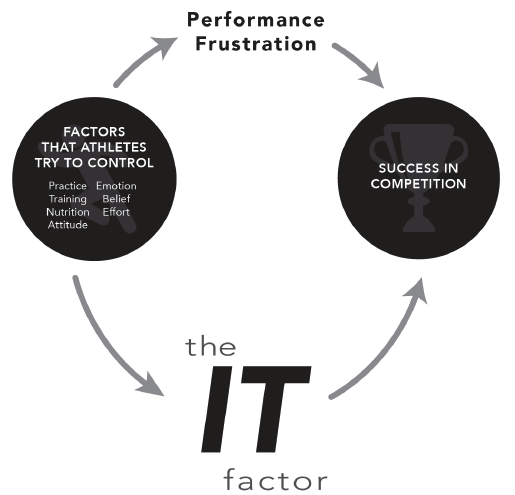
Bhrett McCabe
How to Develop the "IT" Factor
You’re human, an imperfect person who is working as hard as possible to learn more about yourself through competitive experiences. From a competition standpoint, you need to know what ultimate intangible you possess that can help you succeed. That’s your advantage, and it’s how you can use your emotions, decisions, thoughts, and pressure to work for you rather against you.

"The greats know that they themselves are the sole factor that differentiates them and their competitive mindset from those hoping to find it each game or week."
The Competitive Magic
The left circle (above) describes the area in which so many athletes function. In that circle are all the things under your control. Whether it’s how you practice, how you eat, or how you receive your coaching, the circle is essentially your preparation plan. In theory, the harder you work, the bigger, stronger, and more powerful that circle becomes.
On the right (above) is your goal: SUCCESS. The desire to win and to continue to win is the goal of most, if not all, athletes.
A common misconception of generations of athletes is that if you do everything you can in the left circle, it will lead to success in the right circle. That may be a great story, but it’s not really accurate. The greatest athletes in the world embody something else: They have the “IT Factor.” The best of the best understand that they are the ultimate intangible that brings all the factors under their control and allows them to use those factors to compete for the ultimate outcome. The factors in the left circle are the investments and the outcome is the profit, but the IT Factor – you – is the vehicle that makes that happen. And it never happens without the IT Factor.
Those with a great IT Factor understand that there will be times when their emotions are out of control and others when their emotions are in check, and times when the game is easy and times when the game is hard. But regardless of the circumstances, they are essentially still the same person.
High-achievers who embody the IT Factor understand what they want and are ready to do what it takes in competition to get there. They keep their expectations down but the demands on their process high, always scrutinizing the situation to see how they can make the process work better for them. Each game, match, or event is a learning environment. It is never determined. These high-achievers are willing to sacrifice a lot to reach the pinnacle of success, but they’re also able to sacrifice one thing that few others are willing to give up: their self-preservation aspect, often referred to as the ego.
The greats just see the game differently, and I think it’s that gap between training and success that makes them better and better. It’s hard for an athlete to let go of the training circle. But does this mean that training isn’t important? No. In fact, exactly the opposite is true.
Training is the investment that you make in yourself and your process to achieve success. It’s how you apply it – understanding your emotions, limiting your expectations, and choosing to persevere through the uncertainty of life and sports. The investment is deposited each and every day during training, put away for withdrawal when it’s needed. Unfortunately, too many athletes fail to invest in themselves, and when competition gets hard, the only thing they can do is borrow against themselves, paying interest and hoping that they can get the competition loan. What is it that they are borrowing? Hope. When athletes fail to invest in themselves, the only thing that they can rely on in high-pressure environments is hope that they will be able to find something to succeed. The problem is that this is not a sustainable performance model.
Great athletes think differently. They know they have the investment in the bank, and they trust that they can draw on it when it matters the most. It’s not about finding magic, it’s about trusting in those investments. It’s the difference between hoping and knowing. Furthermore, the greats know that they themselves are the sole factor that differentiates them and their competitive mindset from those hoping to find it each game or week.
I’ve never met a champion who didn’t believe in his or her ability to compete. When they are open and honest about it, it always comes back to the IT Factor, something that they believe about themselves that helps them overcome the challenges and win. Knowing that you embody a secret that your opponents may be lacking is incredibly empowering. And if it’s so powerful and effective, why not learn to develop one for yourself?